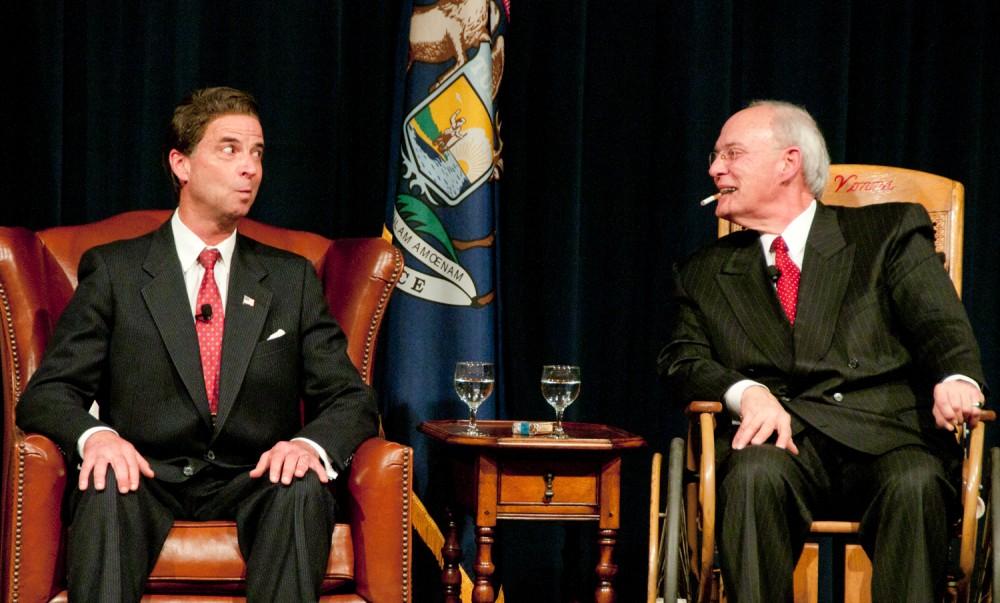History in action

Performing at Reagan’s Heroes
Feb 21, 2011
This is not your average history lecture.
The Hauenstein Center produced an original historical play for the celebration of former U.S. President Reagan’s 100th birthday at the Gerald R. Ford Museum on Tuesday. Four lazy boy-style chairs set the stage and left space for a fifth recliner. With the auditorium lights low, Hauenstein Center Director Gleaves Whitney narrated the stories of the four American presidents who most influenced Reagan.
Thomas Jefferson, played by Bill Barker, was the first American president to take the stage. From his black, tight-fitted trousers to his long coat, from his broad ship-shaped hat to his curled white wig, Barker looked the part.
Barker transported the audience back to the times of the 1700s with perfect Virginian dialect. He spoke of the invention of the steam engine, a precursor to a more important invention: democracy.
“Never forget the invention of the principles that created this nation,” Jefferson said. “We found a nation of democracy, in the midst of a diversity of opinions, where men can freely express opinions. These principles brought together thirteen individual nations, who put aside their differences for the common good of all.”
Jefferson took the first seat onstage, then entered Calvin Coolidge, Jr., the 30th president, portrayed by Jim Cooke. Cooke said Coolidge, a man of small stature, became president after the sudden death of Warren G. Harding.
Reagan admired the man of few words because of his economic and tax reform policies.
Franklin Roosevelt, played by John Hamant, came onto the stage in a wheel-chair. The 32nd president, paralyzed from the waist down due to polio, influenced Reagan because of optimism and leadership during wartime.
Hamant spoke about the challenges Roosevelt overcame – unemployment, farmers losing their farms and people beginning to doubt the merits of democracy.
“We all love America,” Roosevelt said. “It doesn’t matter party affiliation. We must be able to combat these crises by joining hands and working together. That’s the secret of America: joining hands together to do the work. Future generations will look back and not repeat the same mistakes.”
Roosevelt joined Jefferson and Coolidge Jr. on the stage as actor Brian Hilton stepped up to portray John F. Kennedy. The youthful, dark-haired and charismatic impersonator focused his address to the youth. Kennedy wanted to inspire youth to enter public leadership, so he created the Peace Corps.
“Leadership is needed from a chief executive, not salesmanship,” Roosevelt said.
Although a democrat, Kennedy’s tax cuts and tough stance against communism influenced Reagan.
Finally, Ronald Reagan, played by Paddy Morrissey, moved the crowd in tears with his Reagan-like voice and humorous sound-bites.
“I stumbled upon doing Ronald Reagan,” Morrisey said. “I was watching him on the TV immediately after he was elected, and a mirror was directly behind the TV. I looked up and saw myself mimicking his facial movements. I then bought a ladies’ wig from the Salvation Army, cut it and sprayed it thoroughly with hair spray and went on stage that night and started doing him. That was in 1981 – 30 years now of doing Reagan.”
Morrisey’s character elaborated on Reagan’s philosophy – he wanted the government off the backs of the people and get them working again.
“Some people think that government is the solution, but they are the problem,” Reagan said. “The things you most admire, you work the hardest for.”
Audience member Ryan Richert of Spring Lake, Mich., enjoyed the historical accuracy of the costumes and characters.
“I know that Reagan was one of the best presidents but didn’t know he wasn’t a Republican till age 51,” Richert said.
Although Richert was one of the very few young people at the event, he posed an adult question concerning leadership, the core subject of the production.
“Does man have the ability to govern himself?” Richert asked.
During the Q&A session at the conclusion of the event President Thomas Haas’ question to the interpreters helped bring Richert’s doubt to contemporary light.
“What advice would you have for President Obama?” Hass asked.
“To be successful you must never do in private, which you would never do in public,” President Jefferson said. “The true art in government is simply being honest.”

























